Ever notice it’s easier to understand how not to do something, rather than how to?
Comedy is a valuable way to achieve this. The video from the popular TV show The Office, perfectly illustrates how not to conduct an incentive program for your business. Watch the video.
What did they do right?
What did they do wrong in building an incentive?
My middle son just got a tattoo on the inside of his left arm. He mentioned it was a bit painful.
The Right and Wrong of Mini-Games
Mini-Games are short-term, intensely focused, rapid improvement campaigns design to affect a change, correct a weakness, or pursue an opportunity within the company. There is a team goal, a scoreboard, and a reward for winning. Mini-Games come from the Great Game of Business, and Jack Stack’s books A Stake in the Outcome, and The Great Game of Business. It’s an Open Book Management Philosophy.
Great Game is a way of running your company to get everyone involved and engaged as the owner is in making the company successful. It about fully engaging employees in the business by teaching them how the business works and what is critical to success. It’s understanding how profitability is driven, assets are used, how cash is generated, and most importantly how employee’s day-to-day actions and decisions make or break your business. Great Game of Business is one of our Gazelle’s coaching partners. Jack spoke to our coaching group in Dallas last October.
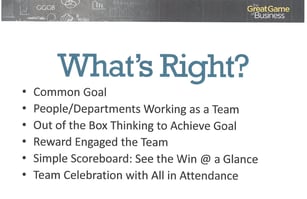 Jack Stack believes, “When you appeal to the highest level of thinking you get the highest level of performance.”
Jack Stack believes, “When you appeal to the highest level of thinking you get the highest level of performance.”
Mini-Games are a small part of the overall Great Game of Business. They can be created whether you’re following the entire process of Great Game or not.
Back to our video:
What did Andy Bernard (played by Ed Helms) do right?
Review the bullet points on the right. Will review many of these pointes as well as provide best practices.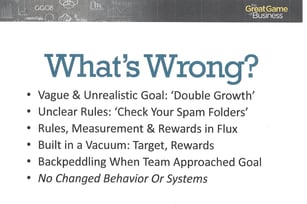
What should have Andy done differently?
Review these bullet points to discover what Andy did wrong.
People Support What They Create
One of the elements missing here is Andy failed to gather the support of his team in creating the incentive program. As the picture here notes: People Support What They Help Create. Your people need something GGOB calls establishing “line of sight.” Line of Sight simply means people understand the connection between what they do every day, individually and as a team, with the outcomes they produce.
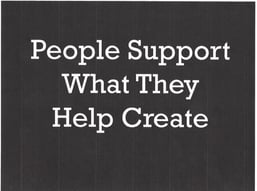 “The way you produce the plan is just as important as the plan itself… To get ownership and ensure results, you must focus on how your plans are created and how people are involved in the process.” ~ Jack Stack
“The way you produce the plan is just as important as the plan itself… To get ownership and ensure results, you must focus on how your plans are created and how people are involved in the process.” ~ Jack Stack
If your people don’t participate, they don’t buy in. If they don’t buy in, they don’t commit. If they don’t commit, they don’t deliver.
When done right, Mini-games shift the mindset from, “here’s your plan” to “this is our plan.”
Rapid Results Lasting Change
Mini-Games are targeted at day-today improvements that add up to long-term success. Every small win puts you that much closer to a big win. In Great Game, everybody’s focus should be on the goal of the big game – The Critical Number. The only way to achieve the goal of the big Game is by acting on the every day activities and and behavior that influence The Critical Number.
Why play a Mini-Game?
- Affect a change: To strengthen the business by driving results through improved performance. In a Mini-Game teams are challenged to find solutions to current problems and take advantage of current opportunities – whatever it takes to achieve a goal.
- Reinforce business education: A Mini-Game is really an abbreviated version of the Great Game of Business annual focus on a critical number. Teaching your team to track, measure and report activity, shows them how they can contribute to team success and be rewarded for doing so.
- Build Teamwork: Players on a team (workgroup, department or company) share a common goal. Individuals are valued, yet by uniting them in a team effort to achieve a goal, you reward team effort. Shared rewards give each player a vested interest in helping their team achieve their goals.
- Develop a winning attitude: Winners are recognized and rewarded. Mini-Games instill the desire to win. Used often they make winning a habit.
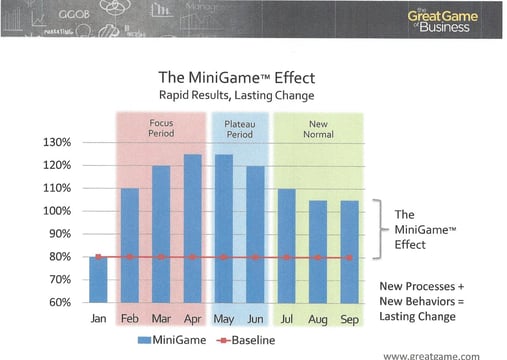
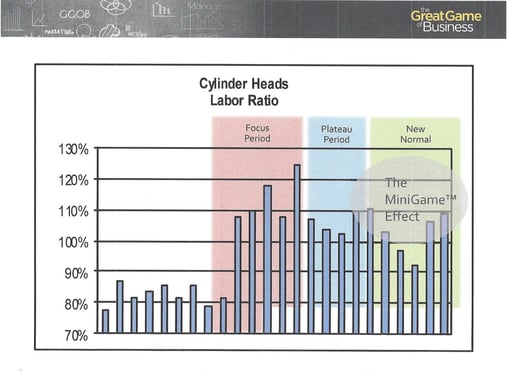 These charts provide examples of how Mini-Games provide not only short term results but lasting effects in the New Normal that results.
These charts provide examples of how Mini-Games provide not only short term results but lasting effects in the New Normal that results.
Educating your team on the importance of producing near-team goals, focusing them intensely on how to improve it, you execute daily in a way to provide rapid results and lasting change.
Mini-Game targets in the Great Game of Business are intended to directly influence the Critical Number. However there are any number of potential Mini-Game targets that can impact your business. See the potential examples offered in this chart.
Mini-Game Rules
Here are some Mini-Game Design Steps to help you create your Successful Mini-Game:
- Name the Game – What’s the Improvement Objective?
- Set the Goal
- Estimate the Benefit
- Identify the players
- Determine the timeframe
- Develop a theme and build a scoreboard
- Decide on the reward
- Establish a Huddle Rhythm
- Play the Game
- Celebrate the Win
Would your business benefit from incentive programs like Mini-Games or Themes? Contact dwick@positioningsystems.com for help with this or any of the Four Decisions tools we coach to help get your business growing and communicating better.
Next Blog – Dashboards and a Successful Mini-Game Example.
One of the most important elements in building a successful Mini-Game is creating a Dashboard. Great Game of Business recommends you understand and can read the results in just three seconds. We’ll look at a few examples, and share a successful Mini-Game one of my customers just completed next blog.






.jpeg?width=150&height=135&name=Hand%20with%20marker%20writing%20the%20question%20Whats%20Next_%20(1).jpeg)

